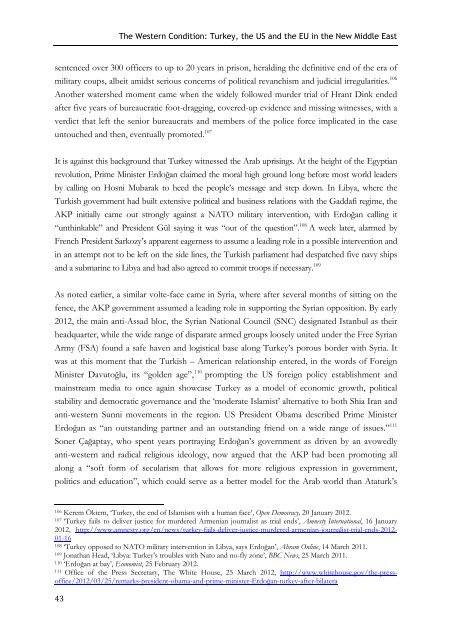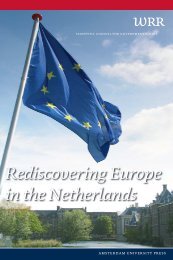The Western Condition - St Antony's College - University of Oxford
The Western Condition - St Antony's College - University of Oxford
The Western Condition - St Antony's College - University of Oxford
You also want an ePaper? Increase the reach of your titles
YUMPU automatically turns print PDFs into web optimized ePapers that Google loves.
<strong>The</strong> <strong>Western</strong> <strong>Condition</strong>: Turkey, the US and the EU in the New Middle East<br />
sentenced over 300 <strong>of</strong>ficers to up to 20 years in prison, heralding the definitive end <strong>of</strong> the era <strong>of</strong><br />
military coups, albeit amidst serious concerns <strong>of</strong> political revanchism and judicial irregularities. 106<br />
Another watershed moment came when the widely followed murder trial <strong>of</strong> Hrant Dink ended<br />
after five years <strong>of</strong> bureaucratic foot-dragging, covered-up evidence and missing witnesses, with a<br />
verdict that left the senior bureaucrats and members <strong>of</strong> the police force implicated in the case<br />
untouched and then, eventually promoted. 107<br />
It is against this background that Turkey witnessed the Arab uprisings. At the height <strong>of</strong> the Egyptian<br />
revolution, Prime Minister Erdoğan claimed the moral high ground long before most world leaders<br />
by calling on Hosni Mubarak to heed the people’s message and step down. In Libya, where the<br />
Turkish government had built extensive political and business relations with the Gaddafi regime, the<br />
AKP initially came out strongly against a NATO military intervention, with Erdoğan calling it<br />
“unthinkable” and President Gül saying it was “out <strong>of</strong> the question”. 108 A week later, alarmed by<br />
French President Sarkozy’s apparent eagerness to assume a leading role in a possible intervention and<br />
in an attempt not to be left on the side lines, the Turkish parliament had despatched five navy ships<br />
and a submarine to Libya and had also agreed to commit troops if necessary. 109<br />
As noted earlier, a similar volte-face came in Syria, where after several months <strong>of</strong> sitting on the<br />
fence, the AKP government assumed a leading role in supporting the Syrian opposition. By early<br />
2012, the main anti-Assad bloc, the Syrian National Council (SNC) designated Istanbul as their<br />
headquarter, while the wide range <strong>of</strong> disparate armed groups loosely united under the Free Syrian<br />
Army (FSA) found a safe haven and logistical base along Turkey’s porous border with Syria. It<br />
was at this moment that the Turkish – American relationship entered, in the words <strong>of</strong> Foreign<br />
Minister Davutoğlu, its “golden age”, 110 prompting the US foreign policy establishment and<br />
mainstream media to once again showcase Turkey as a model <strong>of</strong> economic growth, political<br />
stability and democratic governance and the ‘moderate Islamist’ alternative to both Shia Iran and<br />
anti-western Sunni movements in the region. US President Obama described Prime Minister<br />
Erdoğan as “an outstanding partner and an outstanding friend on a wide range <strong>of</strong> issues.” 111<br />
Soner Çağaptay, who spent years portraying Erdoğan’s government as driven by an avowedly<br />
anti-western and radical religious ideology, now argued that the AKP had been promoting all<br />
along a “s<strong>of</strong>t form <strong>of</strong> secularism that allows for more religious expression in government,<br />
politics and education”, which could serve as a better model for the Arab world than Ataturk’s<br />
106 Kerem Öktem, ‘Turkey, the end <strong>of</strong> Islamism with a human face’, Open Democracy, 20 January 2012.<br />
107 ‘Turkey fails to deliver justice for murdered Armenian journalist as trial ends’, Amnesty International, 16 January<br />
2012, http://www.amnesty.org/en/news/turkey-fails-deliver-justice-murdered-armenian-journalist-trial-ends-2012-<br />
01-16<br />
108 ‘Turkey opposed to NATO military intervention in Libya, says Erdoğan’, Ahram Online, 14 March 2011.<br />
109 Jonathan Head, ‘Libya: Turkey's troubles with Nato and no-fly zone’, BBC News, 25 March 2011.<br />
110 ‘Erdoğan at bay’, Economist, 25 February 2012.<br />
111 Office <strong>of</strong> the Press Secretary, <strong>The</strong> White House, 25 March 2012, http://www.whitehouse.gov/the-press<strong>of</strong>fice/2012/03/25/remarks-president-obama-and-prime-minister-Erdoğan-turkey-after-bilatera<br />
43

















